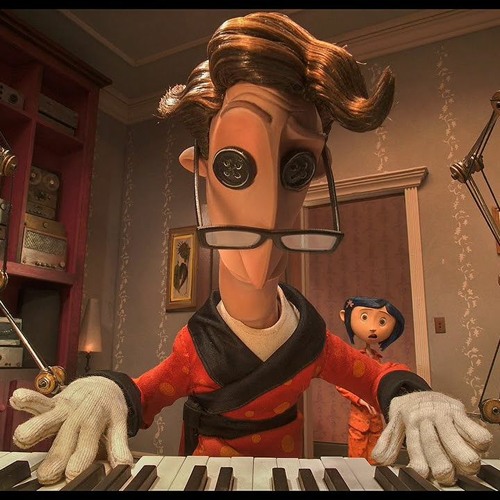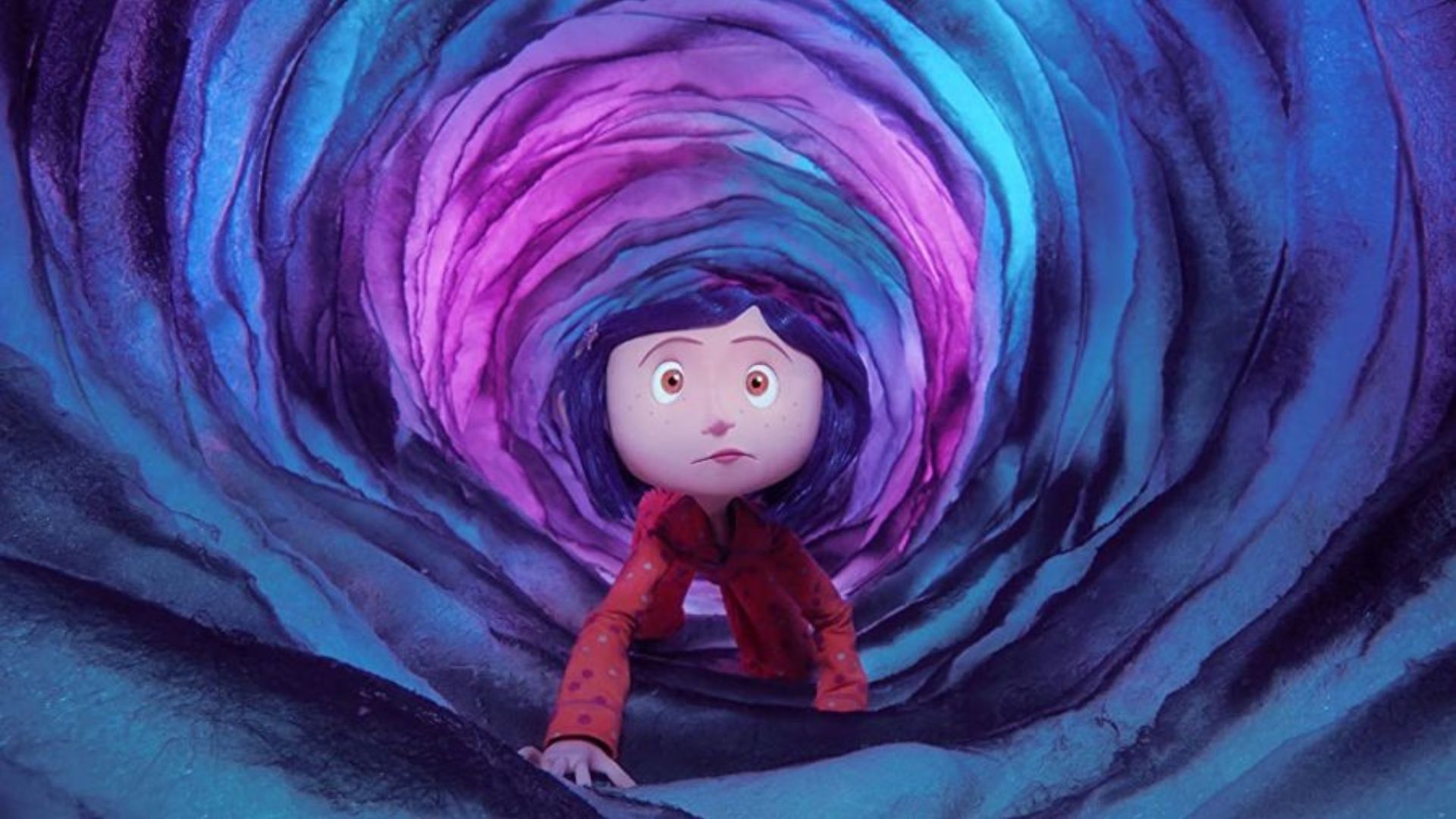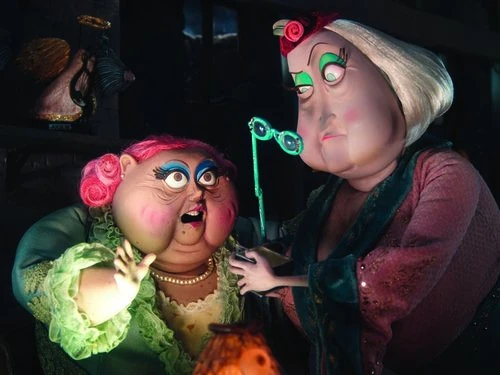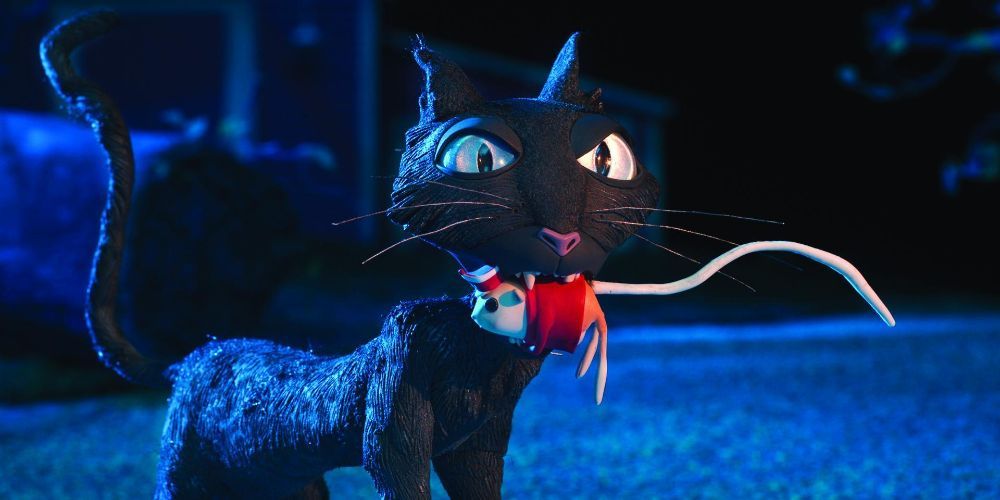Coraline (Film) (2009)
In Coraline, the film represented the other mother as this perfect, feminine, stereotypical house wife. This is the mom Coraline always wished of , who's identity is entirely based on motherhood. This version of the other mother is shown to represent the what the ideal mother should be; perfect, beautiful, and nurturing. However, she is powerful, controlling, monstrous, cunning, sneaky and evil. This goes against what the ideals of a mother should be and are traits of which are bad for any women to have. This demonstrates that a woman being too powerful and unworthy of the mother position (the other mother) must be overthrown and defeated, repressing feminine power. The dolls also represent the stereotypical women’s gender role of nurturer, of mother which is what the other mother uses to lure '' her children''.


The Other Father is represented as weak and helpless which contradicts the ideals of what a man and father should be. It becomes clear that the Other Father is under the control of the Other Mother and is only able to function under her power. For example, the Other Father calling the Other Mother ''boss''. The Other Father’s uncanny puppet-like characteristics become more prominent through this deterioration. He moves when the Other Mother moves him and speaks when she allows it. Along with the Other Father, all aspects of the Other World including the environment and setting are under the control of the Other Mother. the Other Father is also uncanny because he represents a departure from current cultural social norms. Although male, he has no power or control; this is a representation of the familiar and repressed mother-child dyadic relationship where the mother is the central position and the father has a lower standing. As the film progresses and the Other Father is presented as more and more ineffectual, he is depicted as sickly and unsightly. He cannot exist as a healthy person without his individuality and personal authority, and because he is a father without familial and social authority as well.

As Coraline demonstrates a child’s struggle for identity separate from her parents, it is also specifically a struggle for a woman’s identity. Coraline is a female fantasy, marked as occurring in a pink palace where Coraline tries to figure out her mother’s place and function allowing Coraline to find her own as well. Coraline’s resolution with the Other Mother is a resolution within herself and her own perception. From the Other Mother’s gendered foreignness, Coraline learns how to be appropriately feminine. Coraline resolves the uncanny feminine by repressing it as other. She steps into the position of an appropriately gendered individual, learning how to interact in a proper way with the people outside of herself. The film represents certain gendered portrayals as abnormal, in this case femininity, and others and destroys it. Coraline even tries to enforce gender roles in her family - she wants a "perfect" family. She doesn't like that her father is the one to do the cooking, and asks her mother why she doesn't ever cook. This can be interpreted as strange because usually it doesn't happen that way. Coraline either wants her mother to cook because her father's meals are so horrible, or if it is evidence of how pervasive gender roles are in society and how ingrained they are even in young children.

While Coraline represses and removes the Other Mother and Other Father, the benevolent doubles are foreigners who help Coraline and provide ways to negotiate her own identity. The British neighbors, Miss Spink and Miss Forcible. The British neighbors are elderly and clearly not normal, even the original mother thinks of them as “dingbats.” This contributes that the elderly are depicted differently effecting Coraline and her mother not to take them seriously. Their exaggerated comic appearance reflects this depiction. The sisters are visibly elderly with wrinkles, walkers, and wigs; Miss Spink is short and very rotund, and Miss Forcible is tall with outrageously proportioned breasts. In Miss Spink’s first appearance in the film, she remarks about the hotness of the male movers.They are depicted as oversexed and vain women who have never learned to live without each other. This also contributes to how Miss Spink and Miss Forcible do not get taken seriously even potentially effecting viewers to think of them as lower woman since they do not represent the ''ideal'' elderly woman. Additionally, they surround themselves with nostalgic mementos of their past career including posters from their Shakespeare performances. This suggests the lack of lifelong satisfaction that career has brought these women; they cannot continue to work past their prime and must constantly commemorate their heyday. Miss Spink and Miss Forcible’s strangeness is articulated through their foreignness of age, gender, and ethnicity.

The cat is racialized in his position as well as his voice, since it is inferred that he is of color. The cat uses his magical and spiritual gifts for the white character, Coraline. He is the only character that moves between both worlds, and he has knowledge far beyond a cat or even a human. Along with being black, the cat is clearly male, yet in this case he is powerful. This differentiates himself racially and personally who is of color and the other white men as they are represented as weak. As powerful as the cat is, he acts in a service role because of the cat’s position on language, individualization and refusal to acknowledge fantasy.This can also be racially motivated since he is of color helping out the white character (Coraline). Coraline even silences the cat in the normal world even though he is a powerful man. When Coraline tells him that cats can’t talk at home, he responds “No? Well, you're clearly the expert on these things. After all, I'm just a big fat wuss puss.” He suggests that not only does Coraline mock him and not take him seriously, but that Coraline’s focus on verbal talking ignores other aspects and types of communication. Also, it can be inferred that Coraline is used to the men in her family being weak, so she doubts men overall as she also doubts Wybie (her friend) throughout the film.


